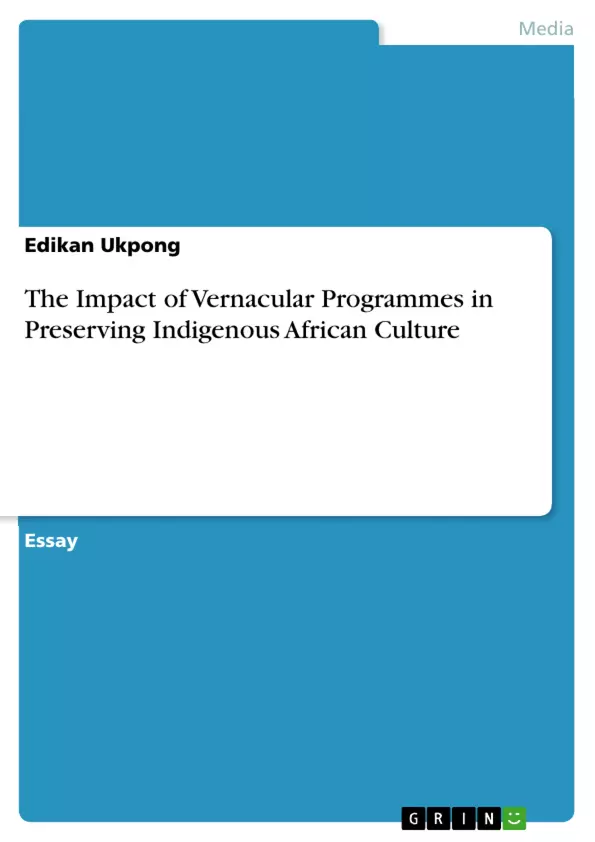The Mass Media are considered principal institutions with the mandate to facilitate dialogue and provide relevant information to the citizenry. Through news and messages provided by these media members of the public get a better understanding of their society. Dialogue carried out by humans especially through the instrumentality of the mass media mainly include exchange of information in a language understood by the people involved in the communication process. For this reason, effective, persuasive communication can only take place if a common language is used. Communicating in indigenous languages, it has been noted, enhances social cohesion, which facilitates the preservation of African cultures.
Inhaltsverzeichnis (Table of Contents)
- Introduction
- Statement of the Problem
- Research Objectives and Question
- Definition of Terms
- Communication and Language
- Literature Review
- Methodology
- Data Presentation and Analysis
- Discussion of Findings
- Recommendations
- Conclusion
Zielsetzung und Themenschwerpunkte (Objectives and Key Themes)
This research aims to investigate the perception of Uyo residents towards vernacular programmes on AKBC radio, focusing on their relevance, consistency, and cultural promotion. The study seeks to understand the role of vernacular radio in preserving local languages and culture in the face of the global dominance of English.
- The impact of English as a global lingua franca on indigenous languages in Africa.
- The role of vernacular radio programmes in promoting cultural preservation and social cohesion.
- The perceived relevance, consistency, and credibility of vernacular programmes among Uyo residents.
- The potential of vernacular radio to contribute to curriculum development and language education.
Zusammenfassung der Kapitel (Chapter Summaries)
- Introduction: This chapter introduces the research topic and sets the context for the study, highlighting the importance of vernacular radio in preserving African cultures and promoting social cohesion. It discusses the role of mass media in transmitting cultural heritage, particularly through the use of indigenous languages.
- Statement of the Problem: This chapter outlines the challenges facing indigenous languages in Africa due to the dominance of English. It explores the impact of English on language use in various domains, including education, government, and the media. The chapter also highlights the decline in language and cultural knowledge among younger generations in Uyo, leading to a concern about the preservation of local languages and traditions.
- Research Objectives and Question: This chapter outlines the specific objectives of the research and the key research questions that will guide the study. The objectives focus on understanding the features of vernacular programmes on AKBC radio, assessing their relevance to the audience, and examining their impact on cultural preservation.
- Definition of Terms: This chapter provides clear definitions for key terms used throughout the research, such as "vernacular," "credibility," "relevance," "perception," and "audience."
- Communication and Language: This chapter delves into the importance of language in communication and its role in shaping social interactions and cultural identity. It examines theories of communication and language, emphasizing the need for shared language and cultural understanding for effective communication.
- Literature Review: This chapter reviews existing research on the importance of vernacular radio in preserving indigenous languages and cultures, examining the benefits and challenges of using vernacular language in the media. It explores different perspectives on the impact of globalization and the dominance of English on local languages.
- Methodology: This chapter outlines the research methodology, describing the methods used to collect and analyze data. It explains the research design, sampling techniques, data collection tools, and data analysis methods used in the study.
- Data Presentation and Analysis: This chapter presents the findings of the research, including the results of the data analysis. It discusses the key findings related to the perception of vernacular programmes on AKBC radio, their relevance, consistency, and impact on cultural preservation.
- Discussion of Findings: This chapter interprets the findings of the research and provides insights into the implications of the study's results. It discusses the relationship between the perception of vernacular programmes and their effectiveness in promoting cultural preservation and language revitalization.
- Recommendations: This chapter presents recommendations based on the research findings, suggesting practical steps to improve the relevance, consistency, and impact of vernacular programmes on AKBC radio. It also offers recommendations for strengthening language education and cultural preservation efforts in Uyo.
Schlüsselwörter (Keywords)
This research focuses on vernacular programmes, indigenous languages, cultural preservation, radio broadcasting, audience perception, and the impact of globalization on African languages. It explores themes of language revitalization, social cohesion, and the role of media in promoting cultural heritage.
Frequently Asked Questions
What is the role of vernacular radio in Africa?
Vernacular radio facilitates dialogue in local languages, enhances social cohesion, and plays a vital role in preserving indigenous cultures against the dominance of English.
How does the English language impact indigenous African cultures?
The global dominance of English often leads to a decline in the use of local languages in education, government, and media, threatening cultural heritage.
What does the study of Uyo residents reveal?
The research investigates how residents perceive vernacular programmes on AKBC radio regarding their relevance, consistency, and effectiveness in promoting local traditions.
Can vernacular radio contribute to education?
Yes, the study explores the potential of these programmes to support curriculum development and language education for younger generations.
Why is common language essential for communication?
Effective and persuasive communication requires a shared language to ensure messages are understood and to foster a sense of cultural identity.
- Arbeit zitieren
- Edikan Ukpong (Autor:in), 2016, The Impact of Vernacular Programmes in Preserving Indigenous African Culture, München, GRIN Verlag, https://www.grin.com/document/469010



